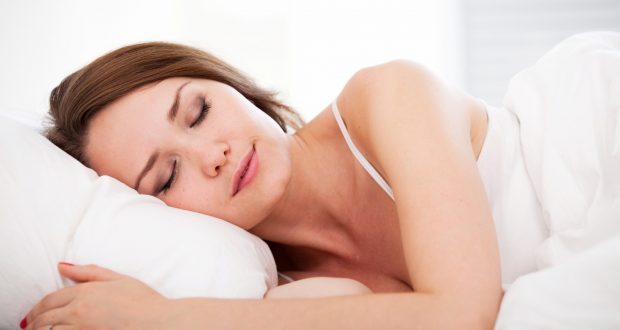By: Guest Author
Published: June 5, 2017
Contributed by Hilary Thompson- Guest Contributor
As a child, your scheduled naps and bedtimes seemed like the worst punishment invented. You likely balled your hands into fists and stomped your feet when you were told to take a nap. By adulthood, your attitude shifted a little. Naps were okay, especially after an all-night study session or a long day at work.
Today, your perspective on sleep continues to evolve. Kids, work, and aging zap your energy and cause bedtimes and sleep patterns to shift. You may even ask your friends, “Going to bed at 9 p.m. isn’t too early for people our age, is it?” “Of course not,” they reassure you.
But something happens when menopause hits: sleep becomes elusive. Hot flashes and night sweats wake you up in the middle of the night, leaving you with drenched sheets and a perturbed partner. You could also suffer from insomnia as you go through menopause—you would love to sleep, but you can’t. This lack of sleep leads you to struggle with irritability, anxiety, daytime drowsiness, or, in some instances, depression.
Menopause is no fun, and neither are its symptoms. Fortunately, you can overcome many of its effects with natural remedies, lifestyle changes, and other products. If you’re in the midst of menopause, check out the list below to help you decide where to start with improving your sleep and health.
Herbal supplements
During menopause, hormones fluctuate and affect your body’s chemical balance. Melatonin, a chemical your body produces to help you fall asleep, also decreases as you age. Because of that lower level, you may want to take melatonin supplements before bed to help you fall asleep and stay asleep.
You can take other natural supplements to improve sleep, including soy, flaxseed, dong quai, black cohosh, and vitamins E and B. Some of these remedies target hot flashes, while others, like dong quai and flaxseed, help balance hormones. You can incorporate a few of them, like soy or flaxseed, into daily meals, and you may have to take others as a pill or powder supplement. Before you start taking any supplements, make sure to check with your doctor first, and follow the instructions exactly when you do use herbal supplements.
Essential oils
Several essential oils can combat insomnia or restless sleep that hot flashes and night sweats cause. Likewise, these oils can relieve you of other menopause symptoms, like cramping. These oils include sage, peppermint, lavender, evening primrose, geranium, basil, and citrus. Depending on your preference, you can combine some of these oils with lotions to use throughout the day or use essential oils for aromatherapy.
Some oils offer added benefits as well. Lavender, for example, is believed to increase relaxation. Some research on sage suggests it helps prevent osteoporosis, which becomes an increased health risk during and after menopause. Again, remember to check with your medical provider before starting an essential oils or aromatherapy regimen.
Herbal teas
If using essential oils isn’t your thing, consider drinking herbal teas instead. Many teas induce sleepiness and relaxation and can relieve menopause symptoms. Black cohosh tea, for example, can alleviate the strength and length of hot flashes. It may also ease cramps, which some women experience during menopause.
Also, consider chasteberry and ginseng teas. Chasteberry, sometimes called “chaste tree tea,” can reduce hot flashes and may improve mood. Ginseng can also lessen the frequency of hot flashes, relieve night sweats, and increase mental focus.
Daily routines
Another effective way to manage menopause is to examine your diet and sleep routine. Changing your diet to include more essential minerals and healthy fats can help balance your hormones and decrease menopause symptoms. Fruits and vegetables are a must, as are high-fiber foods and foods that contain flaxseed, soy, and omega-3 fats. These specific foods and nutrients are essential for helping you manage your discomfort.
Next, evaluate your sleep habits and patterns. Committing to a bedtime can improve your ability to fall and stay asleep. Activity trackers and mobile apps can identify trends in your sleep, too, although you should confirm this data with a medical professional. You may also wish to visit a cognitive behavioral therapist to receive a personalized sleep strategy so you can get adequate rest during menopause.
Cooling pillows and bed accessories
Many women love cooling gel pillows because these pillows can make you comfortable during hot flashes and night sweats. These pillows respond to your body’s temperature, preventing sweat from waking you up in the middle of the night. The pillows also contain anti-wicking material, too, to keep you sweat free.
Additionally, some mattresses are designed to help manage menopause. You can even find temperature-regulating sheets, which let you and your bedmate stay cool through the night and wake refreshed.
If these solutions don’t help, or you experience chronic bouts of insomnia, visit your primary care provider. They can run tests and assess things like your thyroid levels or look for vitamin deficiencies. Your body can and will change—it’s a given in women’s health and aging—but you aren’t without resources. Physicians, pillows, and homeopathic remedies can help you sleep better before, during, and after menopause.
HILARY THOMPSON BIO:
 Hilary Thompson is a freelance writer specializing in health and wellness. She’s been featured in publications like Reader’s Digest, BestLife and Today. She specializes in senior health, family sleep issues, and sleep disorders, but frequently covers a variety of topics ranging from fitness to family dynamics. A mother of two, she lives in Utah with her family and French Bulldog named Stella.
Hilary Thompson is a freelance writer specializing in health and wellness. She’s been featured in publications like Reader’s Digest, BestLife and Today. She specializes in senior health, family sleep issues, and sleep disorders, but frequently covers a variety of topics ranging from fitness to family dynamics. A mother of two, she lives in Utah with her family and French Bulldog named Stella.
The views expressed herein this article, written by a guest contributor, do not necessarily represent those of the Red Hot Mamas organization. The content is for informational purposes and should not substitute the advice of your doctor.
 Red Hot Mamas In Charge of Change.
Red Hot Mamas In Charge of Change.




